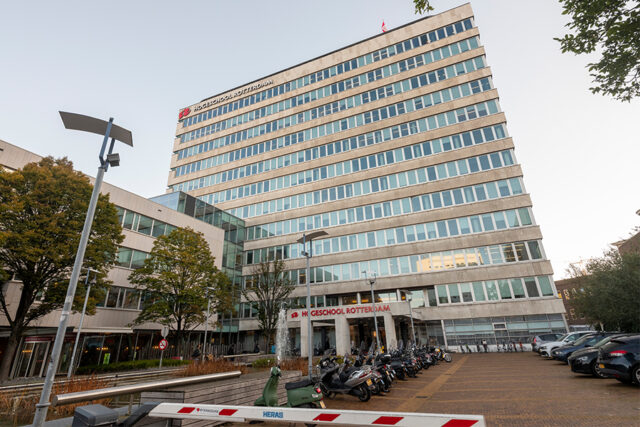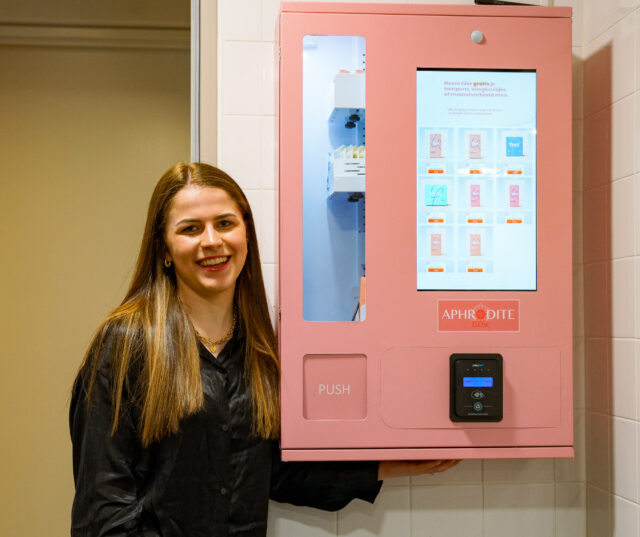You can be abroad in Rotterdam according to new definition
Gepubliceerd: 24 July 2017 • Leestijd: 3 minuten en 20 seconden • English Dit artikel is meer dan een jaar oud.What has happened to the word ‘abroad’ in the new internationalisation policy put forth by Rotterdam University?

Never before has the international policy of the Rotterdam University of Applied Sciences been so local. Strangely enough, the advisory to the executive board of RUAS about internationalisation which appeared at the beginning of June mostly concerns Rotterdam and the international, culturally diverse nature of the city. It almost seems as if being abroad begins right outside the doors of the Rotterdam University of Applied Sciences.
As far as internationalisation lecturer and co-author of the advisory Leo Klienbannink is concerned, that’s true. ‘Ninety percent of the people relate internationalisation to students going abroad or foreign students coming here to study. But the new vision of internationalisation must appeal to all institutions and study programmes, not just Rotterdam Business School, which already has so many international students running around.
Bringing what is abroad to Rotterdam
The point is, Klienbannink explains, that there are many other forms of internationalisation. Klienbannink’s main purpose is to remove that age-old emphasis on being abroad from the concept of ‘internationalisation’. Only then will we be able to see how broadly applicable the concept is.
‘Every student at RUAS has to be internationally competent,’ explains Klienbannink, who has been a university lecturer on internationalisation since September 2015. ‘But not every student goes abroad. And they don’t need to. You can also introduce an international perspective to the university. What do foreigners think about your field? Why not have specialists from abroad come give guest lectures here? Why not start reading international trade publications?’
Broad definition of internationalisation
More important than all of this is the international nature of the city in which students will later practice their professions. ‘Rotterdam is an immensely diverse city. Over 170 different nationalities live here. So, a nurse must have enough intercultural sensitivity to be able to care for patients who come from all those different countries.’
The mission that Leo Klienbannink started nearly two years ago was to make internationalisation something for the many and not just for the few, which borrows from the credo of an English socialist (and hopefully gives this article a bit of international allure, as it is also being written from behind a desk in Rotterdam). Together with his ‘core team’ members Lisanne Broos and Enny Kraaijveld, and joined by a few other ‘internationalisers’, a new definition of internationalisation was conceived that consists of three parts. The main thrust of it is that students need to develop intercultural sensitivity, as well as learning how to interact with the massively diverse population of the big city. In addition, RUAS has set itself the goal of forming an inclusive community in which students from all backgrounds can feel at home.
Virtually abroad
In the six-page advisory written by the internationalisation workgroup, the word ‘abroad’ is only used once. All the way at the end, and even then only in combination with the word ‘virtually’: the workgroup advises that the ‘next (possible) step’ would be to develop a virtual reality international work environment ‘for those students who may not have the opportunity to pursue part of their studies abroad.’ But how will RUAS help more students study abroad?
The advisory has nothing to say about this matter. That’s not what it’s about, says Klienbannink. Being abroad physically is certainly still a ‘substantial part’ of what he calls internationalisation, he says. The CoIA (Centre of International Affairs) continues to help students fulfil their ambitions of studying abroad and pursuing studies as part of its internationalisation policy. However, this is not immediately obvious in the advisory, because instead it emphasises and propagates the new way of thinking about internationalisation.
Accreditation for internationalisation
The advisory also describes this new way of thinking (‘paradigm shift’): ‘Internationalisation is not just mobility (going to and coming from, abroad. ed.) and not a goal in itself, but a means of having students and employees develop international and intercultural competencies.’
Many directors are excited about this new definition, says Klienbannink. ‘Suddenly, institutes that formerly had little to do with internationalisation, now also have something to work with.’ The directors’ meeting of the RUAS already expressed their support of Klienbannink’s vision in December. All that remains now is for the executive board to formally embrace it as well.
Of course, study programmes have to address the new definition themselves, says Klienbannink – if only because internationalisation has also become a recent topic of interest for accreditations, he warns. ‘In the past, a course such as Biology and Medical Laboratory Research did little with internationalisation, but now they’ve picked it up enthusiastically. After completing their studies, Shipbuilding students will work, by definition, for an international market, even though they operate quite locally. Once they start working with this definition, study programmes sometimes come to realise that they are much more international than they originally thought.’
Text: Olmo Linthorst
Illustration: Bart Zwart









Bike Economy as part of the second year project management module, has been considered the international project and executed in different cities of the world. Last school year, I opened Bike Economy to South Rotterdam as an international project. Foreign and Dutch students who participated in this project felt no other difference as those who executed this project in Taiwan, L.A., Poland, etc. Thus, the concept of internalization is not limited by geographical boundaries but rather by the vast composition of diversity in cultures, attitudes, beliefs, perspectives and social behavior.